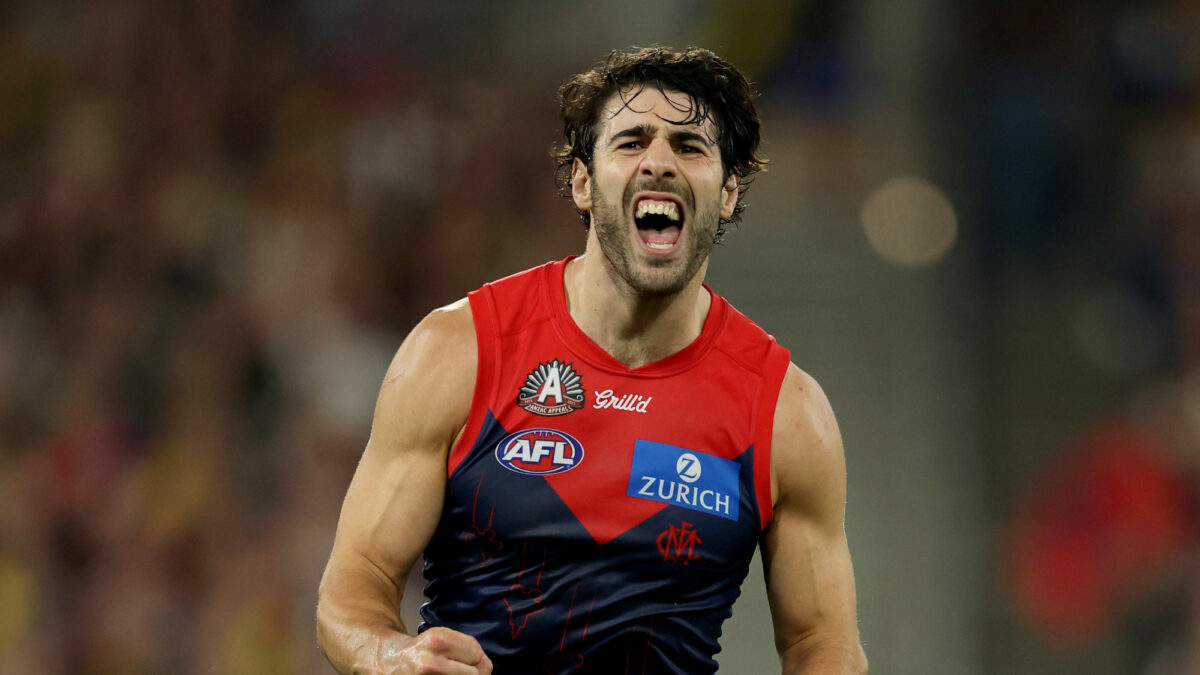There was optimism heading into Thursday night (I refuse on principal to call it Anzac Day Eve) that Melbourne and Richmond, off the back of a pair of wins last week after one between them for the first five rounds of the year, would put on as much of a spectacle as two bottom-four teams could provide.
I think it’s fair to say that, while there were glimpses of competence from both teams throughout the night, particularly in the third quarter as the Dees ripped the game out of the Tigers’ grasp, this was by and large among the year’s least watchable games to date.
For the Demons at least, this shouldn’t matter in the slightest. They’ve won two games in a row, this one by 20 points, are beginning to build some momentum, and while they’re still far closer to ‘bad’ than ‘good’ on the footy spectrum, they’re at least less far gone than they were this time last week.
Forget the last quarter, in which the Tigers banged on the last four goals while best-afield Max Gawn rested up on the bench with the game iced. This was, for all intents and purposes, a six-goal win, one that would be described as ‘workmanlike’ were the Demons a better team merely going through the motions and not a fallen power needing every single win they can get.
More importantly, there is a clear, defined style that the Dees wish to take into games, that has now brought them success against Fremantle and now (eventually) dissected the Tigers… even if it did take them a half of footy to remember that’s what they wanted to do.
From stodgy ball movement, chip kicks and nervy defenders placed under the pump, which saw the Tigers take a shock lead midway through the second quarter and reduced the Demons to a mere 21 inside 50s to half time, Melbourne seemed to flick a switch at the main break; because suddenly, things looked very different.
Handballing was the key: the crucial ingredient to the Dees slicing the Dockers apart in last week’s MCG shootout, and again the reason for a six goals to one third quarter that made the Tigers look the second-rate, feeble outfit they’ve so far admirably avoided looking like for most of this year to date.
From 126 kicks to 76 handballs at half time – an entirely normal ratio – suddenly the Dees squared the ledger, with 64 kicks and 63 handballs in the third term alone.
Practically, this is the way the Demons need to play: so many of their best and brightest are so prone to high, aimless bombs to an outmatched forward line under even the slightest of pressure that Simon Goodwin has been forced to go full Justin Longmuir’s Fremantle to coax some life into their ball movement.
Overlap runners from half-back – usually Jake Bowey or Caleb Windsor – are part of the process, with the Dees backing themselves to attack and either gain territory in increments with fast hands or force a stoppage draw if it does break down.
But part of it as well is the Dees now trying not to rush things, even in heavy traffic.
Take this passage of play midway through the third quarter.
At another time, either Kade Chandler or Gawn would have taken on the shot for goal themselves – Bayley Fritsch has been soundly criticised over the last few years for frequently taking pings from inopportune spots.
Instead, both handball to a player in a better position, and even Christian Petracca, before bursting into space, has his eyes looking for anyone he can give off to; finding none, his snap on the non-preferred is lethal.
But it’s not just a gameplan built on being handball-happy: the Dees have for two consecutive weeks eclipsed the 100-mark threshold, while the two games have featured their highest disposal counts as well.
It’s a patience thing: the Dees go, and go hard, when there’s an avenue forward; but if there isn’t, they are content to switch the play, make incremental territory gains, and in general try and retain possession.
On Thursday night, to defeat the Tigers’ forward press that so sensationally suffocated Gold Coast last week, the Dees racked up the marks: 13 for Christian Salem, 12 for Trent Rivers, nine for Bowey and 11 for Xavier Lindsay, who predominantly roamed the far wing but frequently dropped into defence to present for an outlet option – and was used time and time again.
The proof of the pudding? The Dees’ 46 inside 50s is actually their second-lowest for the year, while 56 of them against Fremantle is bang on what they achieved in losses to GWS and North Melbourne in which they struggled to score; yet their highest two totals of the year have been in the past fortnight.
It’s quality over quantity, and it’s working far better than the old plan.
When they shunned it, problems re-emerged even after half time: with two handball options to use, Salem’s decision to go for a cutesy right-foot pass to Ed Langdon was properly awful, put his teammate under heavy pressure, and coughed up a Richmond goal straightaway.
Of course, there is a significant yellow and black caveat to add to this latest win. Richmond were exceedingly poor, had none of the manic intensity and ferocious pressure that marked their win over Gold Coast, and in general could scarcely force a turnover. Once the Dees took control of the midfield battle – and with Oliver, Petracca and Viney it was only a matter of time – this game was blown to ribbons quickly.
You couldn’t watch this just seconds into the third term and not see a team with some significant work to do over the next few years.
It’s in this context that everyone at Melbourne will surely be viewing this win: bank the four points, avoid following Carlton or the Suns’ lead in blowing a match against a cellar dweller, and begin preparations for next week.
But there are signs of hope: from Max Gawn’s returning dominance in the air and the ruck after a down month to start the year, to Clayton Oliver’s workmanlike second half after being as anonymous as at any point in his career in the first, to Jack Viney’s ferocious tackling back to its very best, to Christian Petracca looming large as a midfielder/forward with two excellent goals.
You still couldn’t possibly call the Demons good. They’re a long way off that.
But they are getting better – and not a minute too soon.






